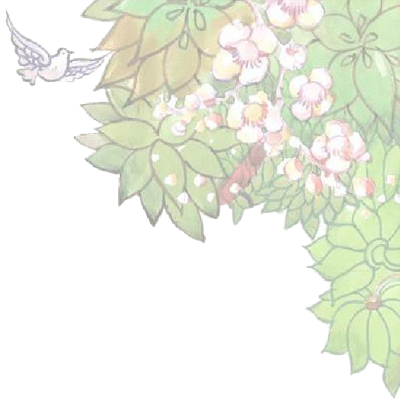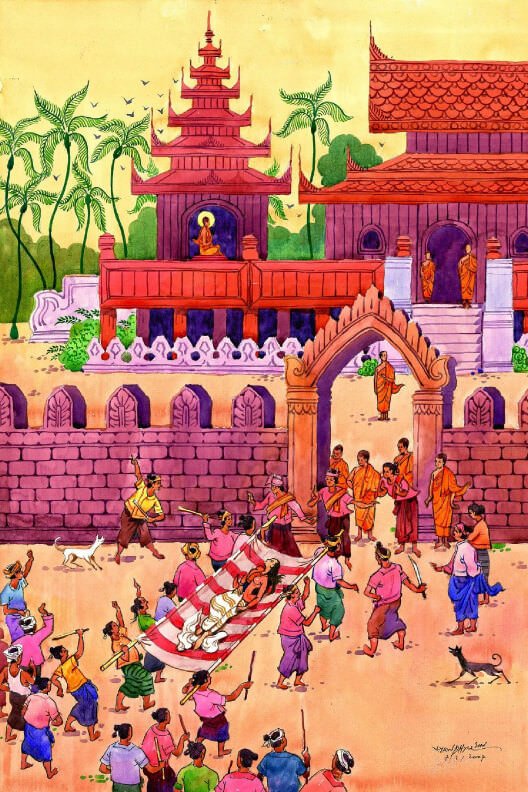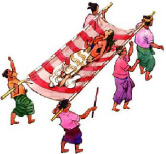54話 美女スンダリーを殺したのは?

第5部 さまざまな「悪」ブッダをめぐる人々
第1章 殺人事件
54話 美女スンダリーを殺したのは?

ブッダの評判を傷つけるために異教徒(外道)たちが狡猾で悪意ある女チンチャマーナヴィカーを送り込んだのは、ブッダの伝道布教の初期であった。次いで、またもや異教徒たちがブッダの評判を落とすために女性スキャンダルを企てたのは、伝道布教の二十年目である。
世尊がジェータヴァナ僧院(祇園精舎)に住まわれていたあるときのこと、世尊は人びとのみならず神々、梵天からも、同様に尊敬され、崇拝されていた。人びとは、衣・托鉢食・臥坐所・医薬品を世尊と僧団(サンガ)に、ふんだんに布施した。だが、異教徒たちは、過去世の功徳の欠如と、現世における悪業のせいで、四資具(衣・托鉢食・臥坐所・医薬品)や、他の供物の不十分さに苦しんだのである。
異教徒たちは、世尊の名声をたいへん妬んだ。異教徒たちの追随者がだんだん減ってきて、世尊の評判をぶちこわす何かをやらなければ、ますます事態が悪化していくのではないか、と危惧したのだ。そこでかれらは集まって、世尊と、その聖なる僧団の名誉を汚す方策を探った。
その集会では、まず手始めに、人びとがなぜ、あのような敬意と熱意をこめて世尊に供物を献げるのか、検討した。ある者は、ゴータマ比丘がマハーサンマタ(訳注:世界最初の王)の直系の子孫であるためだ、といった。また、別の者は、かれが誕生したときに起きたさまざまな奇跡的な出来事のせいだ、といった。他の多くの者たちは、かれの父スッドーダナ王がアシタ仙人にお辞儀するようにさせたとき、かれの足が空中に揚がって仙人の頭に乗ったためである、といった。また別の何人かは、種まきの犂耕祭のあいだに、かれが最初の禅定(ジャーナ)に没入し、蒲桃の木陰に坐って真昼のあとまで動かなかった、そのせいである、といった。さらに何人かは、かれがたいへんな美男だからだ、といい、転輪聖王(訳注:古代インドの理想的な王で、王に求められるすべての条件を備え、武器を用いず正義によって世界を統治する)になれるはずの王位を放棄したためである、という者もいた。
かくて集会では結論が出なかった。真の原因を、かれらはみつけられなかった。なぜなら、かれらはブッダの比類のない特質、道徳完成の実践(波羅蜜(パーラミー))、偉大な布施の実践(永捨(パリッチャーガ))、偉大な修行の実践(所行(チャリヤー))について無知であったからである。まさにそのとき、かれらのうちのある者がゴータマ比丘の名声と稼ぎをぶちこわす策略を思いついた。
「諸兄よ、この世で女と遊ばない男は誰ひとりいない。このゴータマ比丘は若く、美神の如きハンサムな美男だ。ということは同じ年ごろの美しい乙女に、心ひかれるはず。もし、誘惑できなくても、それでもみんなが道徳的な正直さに疑問符を付けるようになるだろう。われらの仲間の女のスンダリー遍歴行者を、ゴータマ比丘の全土的名声の破壊工作に送り込もうではないか」
スンダリーは、サーヴァッティに住む異教徒の女性の遍歴行者で、スンダリー(訳注:パーリ語で美人の意)というその名の通り、少女時代はほかの娘をしのぐ美貌だったが、いまの彼女のふるまい、言葉づかい、考えることは、それはひどいものであった。
その提案後、たちまち集まっていた異教徒たち全員がこの策略に賛成し、さっそくスンダリーのもとへ行った。かれらを見るなり、スンダリーがいった。
「あら、みなさん、なんでみんなで一緒に、ここへ来たんですか?」
しかしながら、かれら全員、黙ったまま部屋の隅に行って、黙ったまま坐った。かれらに近寄って、彼女は何度も何度もきいた。
「あたしになんで何にも答えてくれないの? あたしの何がいけないんですか?」
とうとう、かれらの一人が、こういった。
「わしらは、どんな答えもしてあげないよ。なぜなら、おまえさんが、われらを無視してきたからな。ところでねえさん、わしらがある奴にかなり長いこと痛めつけられているのを、あんた、知ってるかい?」
「誰がみなさんを痛めつけている、というんですか?」
「この辺りにゴータマ比丘が舞い込んできて以来、わしらは大損害をこうむっているのを、あんた、わからないのかい? あいつは、ほんとうはわしらのものになるはずのたくさんの供物を奪っているんだ。ねえさん、あんたの身内のようなわれらのために、ここはひと肌脱いで、手伝ってくれ」
「あら、みなさん、あたしに何ができるっていうんですか? あたしの命は、みなさんみたいな、あたしの身内に、お預けしてるんですもの」
「スンダリーよ、お前さんはとびっきりの美人で、頭のいい若い女だ。お前さんは何回もジェータヴァナ僧院へ行って、ひとに見られるようにして、あいつと寝てるんだな、と思われるようにするんだ。あんたの美貌と悪知恵を最大限使って、出来ることは何でもやって、ゴータマ比丘を破滅させてくれ」
というような次第で、彼女は香水をふりかけて身ぎれいにして、手に花をもち、毎晩、人びとが説法を聴き終えて出てくるころにジェータヴァナ僧院の方向へ歩いて行った。ひとにきかれると、こう答えるのであった。
「ゴータマ比丘をお訪ねしようとしてるんです。わたしはいつも、かれと一緒に香房で過ごしているんです」
しかし、そのまま近くの異教徒たちのたまり場まで進んで行き、そこで夜を過ごした。翌朝、彼女は同じコースを通って戻るのだが、そこは僧院へ向かう人びとが歩いているのであった。ひとにきかれると、こう答えるのであった。
「ゴータマ比丘とかれの香房で一夜を過ごし、愛のおもてなしをして、満足してもらってきたばかりなんです」
数日後、異教徒たちは、彼女がジェータヴァナ僧院へ何度も行くのを多くの人びとに見られている、と知って、彼女がやったことに満足した。そこで異教徒たちは、スンダリーを殺すために何人か飲んだくれを雇った。そして彼女の死体を、ブッダの香房近くの溝の中に、しおれた花が山積みになっている、その下に置かせた。
その翌日、異教徒たちは、スンダリー遍歴行者が姿を消した、というニュースをばらまいた。かれらはコーサラ国のパセーナディ王に、こう届け出た。
「おお、大王さま、われらの女弟子スンダリーがいなくなって、見つかりません」
「どうして彼女がいなくなった、と思うのか?」
「わしらは彼女がジェータヴァナ僧院にいる、と疑っております、大王さま」
「では、ジェータヴァナ僧院を捜せ!」
異教徒たちはジェータヴァナ僧院に行ってスンダリーを捜すふりをした。ほどなくかれらは、山積みのしおれた花の下で、スンダリーの死体を見つけた。かれらは遺体を担架に乗せて王宮へ運び、王に、こう申し立てた。
「おお、大王さま、ゴータマ比丘の弟子たちがスンダリーを殺しました。ジェータヴァナ僧院にあるブッダの香房近くの溝の中に、かれらが彼女の死体を投げ捨てたのです。かれらの師匠の非行を隠蔽するため、しおれた花が山積みの下に隠していました」
まともな捜査もなしに王は、こう告げた。
「お前たちは、市内中に、この事実をふれまわってよろしい」
その後すぐに、異教徒たちはスンダリーの死体を運んで行った。サーヴァッティの市内に入って、かれらは通りから通りで、四つ辻から四つ辻で、こうふれまわった。
「さあ、みなさん、どちらさんも、見てください! 清純に生きて、真実を語り、道徳をまもっている、とほざいている連中が、実は恥知らずの悪意ある嘘つき野郎たちだったのだ! かれらが何をやったか見てください! 情交を楽しんだあと、どうして男は相手の女を殺すことができるんでしょうか?」
その結果、街の人びとが比丘たちを見かけると、異教徒たちにけしかけられたとおりに、口々に厳しく非難し、罵倒し、侮辱した。いつもどおりに托鉢でまわったあとサーヴァッティから帰って、比丘たちは世尊に事情を報告した。世尊はかれらの気持ちを静め、このようにいわれた。
「比丘たちよ、この騒ぎは長くは続かない。わずか七日間であろう。七日後には、収まっているであろう。だから人びとがそのように侮辱しても、次の偈を唱えて諭しなさい」
“嘘をつく者は地獄に堕ちる。
悪事を犯しながら、「わたしはやっていない」という者もまた。
この両者ともに、卑劣な悪業の人。
逝った来世で、ひとしく苦しむ” ・・・ (ダンマパダ306)
世尊からこの偈を教わった比丘たちは、街の人びとから侮辱されると、この偈を唱えて諭した。それをきいて、人びとは、こう考えた。
(この比丘たちは釈迦族の子で、人殺しをやっていないぞ。異教徒たちは非難しているが、違うな。このような気高い人たちだって口汚く侮辱したら言い返すものだが、何もしなかった。その代わり、忍耐してみせて、やみくもに悪口を言ったわれらを、真実で諭されたのだ。唱えられた偈が、かれらは無実だ、と証明しているな)
そのうちに人びとは正気を取り戻し、理性的になった。世尊とかれの弟子たちは、どんな罪も犯したことがないことを、かれらは思い出した。そして、きっとほかの誰かがスンダリーを殺したのだ、と思ったのだが、そのときは比丘たちを殺害者だ、と非難した。騒ぎは長くつづかなかった。七日後には完全に沈静化した。そこで比丘たちが世尊のもとへ行って、こう申し上げた。
「すばらしいことです、尊師よ。驚くべきことです、なんとみごとに世尊は予言されたのでありましょうか!」
このように申し上げた意図を察して、世尊はかれらに、こう勧めた。
「厳しい言葉が比丘にかけられても、動揺せず、冷静な心で、忍耐しなさい」
王はそのころ、スンダリー殺人事件の捜査で密偵らを放った。その捜査中、飲んだくれ二人が居酒屋で争っていた。飲んだくれのうちの一方が、もう片方に大声で怒鳴った。
「で、お前は異教徒たちからもらった金で酒を飲んで、ご機嫌だな。スンダリーを殺して、死体をしおれた花が山積みの下に隠して、それでもらった金なんだろ」
密偵はただちにこの二人を逮捕し、コーサラ国のパセーナディ王のもとまで連行した。
裁判で二人は、異教徒たちにそそのかされてスンダリーを殺した、と認めた。当該の異教徒たちは公式の取り調べに出頭を求められ、殺害の共謀を自供した。王は判決を下し、かれらに市内を回って、人びとに罪を白状するように、と命じた。そこでかれらは市内を回って、こう告げた。
「われらがスンダリーを殺しました。われらは嘘をついて、ゴータマ比丘とかれの弟子たちを破滅させる目的で非難しました。ゴータマ比丘は無実です。かれの弟子たちも同じく無実です。われらのみに罪があります」
当該の異教徒たちはまた、殺人の罪で処罰を受けた。
この事件の結果、人びとは異教徒たちへの尊敬を失い、愛想を尽かした。その反対に世尊と僧団は以前にもまして、尊敬され、崇拝され、尊重されたのであった。
※ 画像やテキストの無断使用はご遠慮ください。/ All rights reserved.

Episode 54 Sundarī, THE FEMALE HERETIC KILLED TO DISCREDIT THE BUDDHA
It was early in the Buddha’s ministry when the heretics sent the cunning and wicked Ciñcamāṇavikā to slander Him. They made another attempt to discredit the Buddha in the twentieth year of His ministry.
One time, when the Blessed One was residing at the Jetavana Monastery, He was honoured and revered by not only man, but by devas and brahmās as well. People made offerings of robes, alms-food, lodging and medicine to the Blessed One and the Saṁgha abundantly. But, the heretics suffered from deficiency of the four requisites and other offerings due to their lack of meritorious deeds in the past and the wrong practice they followed in the present.
The heretics became very jealous of the reputation of the Blessed One—their followers were dwindling, and they also worried that things would get worse if they did not do anything to destroy the reputation of the Buddha. Then they gathered to find a way to disgrace the Blessed One and His Holy Order.
In the meeting, at first the heretics tried to find out why people respectfully and enthusiastically made such wonderful offerings to the Blessed One. One heretic said that it was because the bhikkhu Gotama was a direct descendant of Mahā Sammata. Another heretic said that it was because a variety of miraculous events took place at the time of His birth. Many others said that it was because His feet flew aloft and rested on the head of the sage Asita when King Suddhodana made Him pay respect to the sage. Some others said that during the Ploughing Festival, He was absorbed in the first jhāna, and that the shade of the rose-apple tree under which He was sitting did not move even after noon-tide. Still, some said that it was because He was very handsome, while others speculated that it was because He forsook the Throne of a
Universal Monarch.
Thus, the meeting came to a fruitless discussion. They could not find the real cause because they were ignorant of the Buddha’s incomparable attributes of the practice of perfections (pāramī), the practice of great giving (pariccāga) and the practice of great practices (cariyā). Just then, one of the heretics came forward with a plot to destroy the fame and gains of the bhikkhu Gotama, saying: “Sirs, there is no one in this world who does not get pleasure with women. This bhikkhu Gotama, who is young and endowed with a handsome appearance like a deva, would also be attracted by a maiden of equal age and appearance. In case He cannot be completely seduced, people will still become doubtful of His moral uprightness. Let us send our sister, the
wandering ascetic Sundarī, on this mission to destroy the reputation of the bhikkhu Gotama all over the land.”
Sundarī was a female wandering ascetic (paribbājikā)—a member of the heretics—and lived in Sāvatthi. She was so named because in her youth she had a beautiful appearance excelling others. But her behaviour, speech and thoughts were awful.
Thereupon, all the heretics agreed with the plot and went to Sundarī. On seeing them, Sundarī asked: “Good sirs, why have you come here together?” However, they went to the corner and sat there, all in silence. She approached and asked them again and again: “Why do you not give me any answer? What is my offence?”
Finally, one of the heretics said: “We do not give any reply since you have neglected us. Sister, do you know that we have been quite long oppressed by someone?”
“Who has oppressed you?”
“Don’t you see that since the bhikkhu Gotama wandered around, we have come to a great disadvantage? He has taken over many offerings that actually belong to us. Sister, try and help for the good of your own relatives like us.”
“Good sirs, what can I do for you? My very life is pledged for the good of my relatives like you.”
“Sundarī, you are a very beautiful and clever young lady. You should visit the Jetavana Monastery regularly and make yourself seen by people that you are having sexual dealings with Him. Do anything to the best by means of your appearance and cunning to bring ruin to this bhikkhu Gotama.”
Accordingly, having beautified herself with perfumes and brought flowers in her hand, she went to the direction of the Jetavana Monastery every evening when people came out of the monastery after hearing the discourses. When asked, she would reply: “I am going to visit the bhikkhu Gotama. I usually stay together with Him in His
Fragrant Chamber.” But then, she would proceed to the heretics’ park nearby and spend the night there. In the next morning, she would return home by the same route where many people went to the monastery. When asked, she would tell them: “I have just spent the night with the bhikkhu Gotama in His Fragrant Chamber by serving Him with sexual gratification.”
After a few days, the heretics knew that she had been seen by many people going regularly to the Jetavana Monastery; they were satisfied with what Sundarī had performed. Then, the heretics hired some drunkards to kill Sundarī and put her body under heaps of decayed flowers in a ditch near the Buddha’s Fragrant Chamber.
The next day, the heretics spread the news about the disappearance of the wandering ascetic Sundarī. They went to King Pasenadi Kosala, saying: “O great king, our female disciple, Sundarī, cannot be found.”
“Where do you suspect she is?”
“We suspect she’s in the Jetavana Monastery, great king.”
“Then search the Jetavana Monastery!”
The heretics went to the Jetavana Monastery and pretended to look for Sundarī. Soon, they found the dead body of Sundarī beneath the heaps of decayed flowers. They placed the corpse on a litter and carried it to the palace. Then, they said to the king: “O great king, the disciples of the bhikkhu Gotama have killed Sundarī; they have thrown away her body under heaps of decayed flowers in a ditch near the
Buddha’s Fragrant Chamber in the Jetavana Monastery to cover up the misdeed of their teacher.” The king, without making proper investigation, said: “You may go round the city and proclaim the fact.”
Thereupon, the heretics carried the dead body of Sundarī. Entering Sāvatthi, they went from street to street and from crossroad to crossroad announcing: “See all men and women! They, who claim themselves living in purity, speaking the truth and being virtuous, are actually shameless and wicked liars! See what they have done! How can a man slay a woman when he has finished enjoying sex with her?”
As a result, when the citizens saw bhikkhus, they condemned, reviled and abused them with rude harsh words as instigated by the heretics. Returning from Sāvatthi after their regular alms-round, the bhikkhus then went to the Blessed One and reported the matter. The Blessed One calmed them down, saying: “Bhikkhus, this uproar will not last long. It will only last seven days. At the end of seven days, it will
subside. So, when people abuse you thus, exhort them with this following stanza:
“One who tells lies goes to hell.
Also one who has done evil but afterwards says ‘I did not do it.’
Both of them being men whose acts are vile
Suffer alike in the life to come.”
Having learned this stanza from the Blessed One, when the citizens abused them, the bhikkhus refuted them by uttering it. On hearing it, the people thought: “These bhikkhus, the sons of the Sākyans, had not committed the murder as charged by the heretics. Even these noble persons did not take any steps to retaliate upon us for abusing them with harsh words. Instead, they have shown forbearance and exhorted
us, who have blindly slandered them, with the Truth. Uttering that stanza proves their innocence.”
Soon, people regained their senses and became reasonable again. They remembered that the Blessed One and His disciples were never known to commit any crime. And they believed that someone else had killed Sundarī, but then they accused the bhikkhus as the murderer. The uproar did not last long. After seven days, it subsided completely. Then, the bhikkhus went to the Blessed One and said: “It is wonderful, Lord, it is marvelous how well that was foretold by the Blessed One!”
Knowing the meaning of this, the Blessed One then advised them: “When harsh words are spoken to a bhikkhu, let him endure them with an unruffled mind.”
The king then employed spies to investigate the murder of Sundarī. On one occasion, there were two drunkards who were quarrelling in a tavern. One of them shouted at the other: “So, you are enjoying drinks with the money you got from the heretics for killing Sundarī and keeping her dead body under heaps of decayed flowers.” The spy immediately arrested and brought them to King Pasenadi Kosala.
In court, they admitted killing Sundarī at the instigation of the heretics. The heretics were then called for a formal investigation;
they all admitted that they were the ones who had plotted the assassination. The king gave his judgement by ordering them to go round the city and confess their guilt to people. So, they went round the city saying: “We are the ones who killed Sundarī. We have falsely accused the bhikkhu Gotama and His disciples with the purpose of just
bringing about ruin to the bhikkhu Gotama. The bhikkhu Gotama is innocent; so are His disciples; only we are guilty of the crime.” The heretics also had to undergo punishment for the charge of murder.
As a result of this incident, people lost their respect for the heretics and were disgusted with them. On the contrary, they honoured, revered and esteemed the Blessed One and the Saṁgha more than before.
※ 画像やテキストの無断使用はご遠慮ください。/ All rights reserved.
アシン・クサラダンマ長老
1966年11月21日、インドネシア中部のジャワ州テマングン生まれ。中国系インドネシア人。テマングンは近くに3000メートル級の山々が聳え、山々に囲まれた小さな町。世界遺産のボロブドゥール寺院やディエン高原など観光地にも2,3時間で行ける比較的涼しい土地という。インドネシア・バンドゥンのパラヤンガン大学経済学部(経営学専攻)卒業後、首都ジャカルタのプラセトエイヤ・モレヤ経済ビジネス・スクールで財政学を修め、修士号を取得して卒業後、2年弱、民間企業勤務。1998年インドネシア・テーラワーダ(上座)仏教サンガで沙弥出家し、見習い僧に。詳しく見る
奥田 昭則
1949年徳島県生まれ。日本テーラワーダ仏教協会会員。東京大学仏文科卒。毎日新聞記者として奈良、広島、神戸の各支局、大阪本社の社会部、学芸部、神戸支局編集委員などを経て大阪本社編集局編集委員。1982年の1年間米国の地方紙で研修遊学。2017年ミャンマーに渡り、比丘出家。詳しく見る

※ 画像やテキストの無断使用はご遠慮ください。
All rights reserved.

